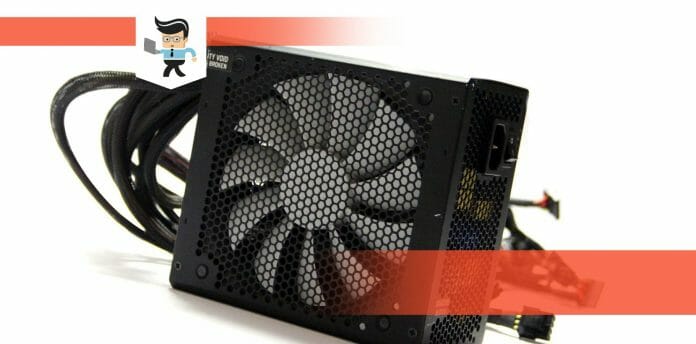How long do power supplies last is a question that depends on many different factors to get the right answer. The reason is that PSUs contain multiple components and the quality of these components as well as how they work together is what determines how long you can use a PSU.
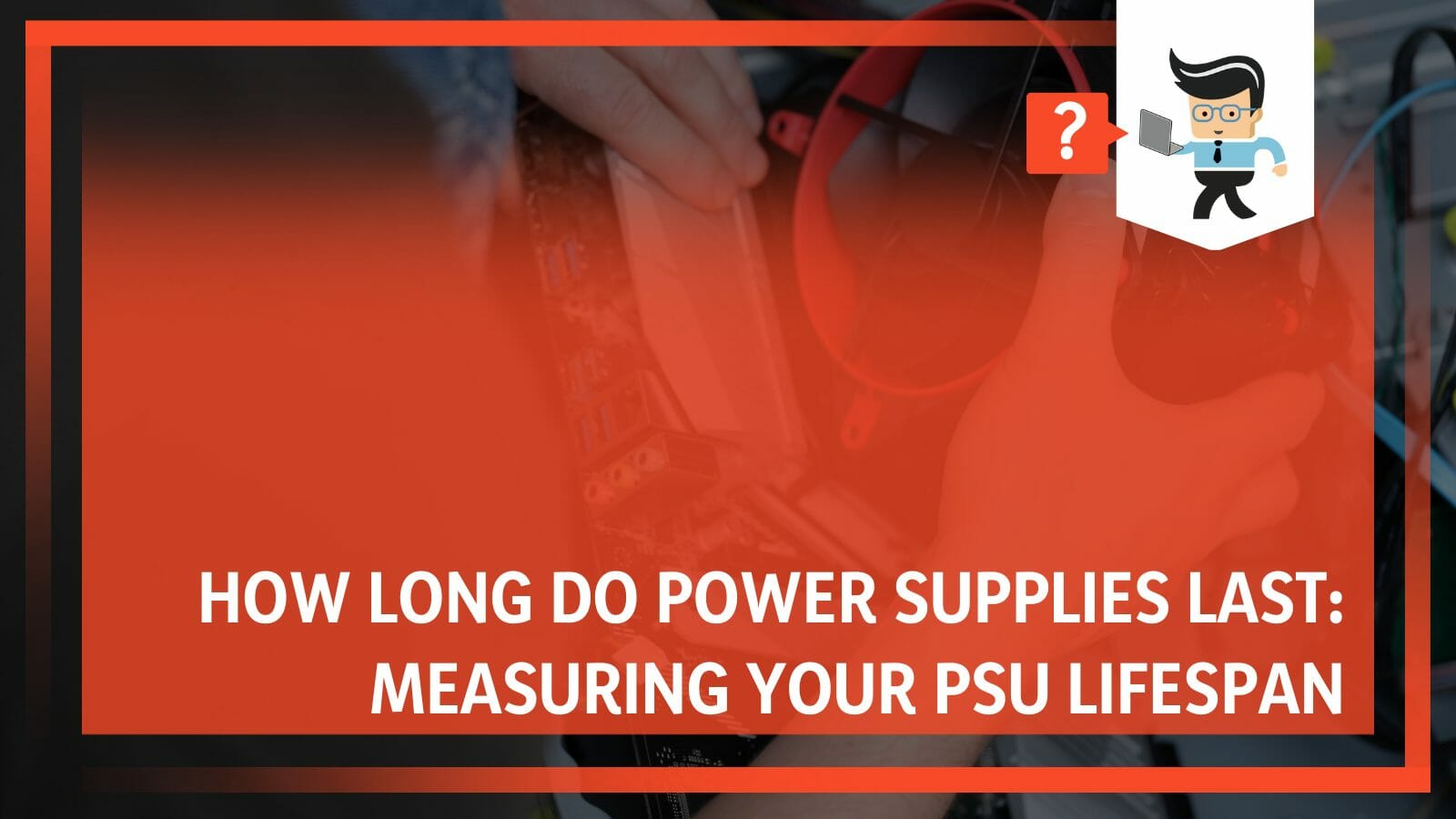
Although most people won’t stop using their PSU until it gives up, it’s recommended that you change them before they become faulty.
Read on as our team breaks down what makes a PSU last and how long you should use your PSUs before deciding to replace them.
Contents
How Long Do Power Supplies Really Last?
The number of years a power supply will really last changes as it depends on the quality of the PSU, the warranty, and power surges. While brands that make PSUs can make speculated guesses and offer corresponding warranties, even they can’t really control how long a PSU will last.
– What To Do When Your Power Supply Fails
If you have already performed the paper clip or jumper test and your power supply unit fans still fail or don’t work properly, then you may need to get a replacement, especially if the power supply is dead on arrival.
Just like most electronic devices, your PSU is not built to last forever. It’ll die at some point, depending on the quality and how it’s used. While some may last up to 30 years, others may arrive at your doorstep dead on arrival.
If you’ve been using it for a while and the warranty is still valid, then you should be able to fill in for a replacement as well. Note that most companies will void your warranty if you disassemble your PSU in any way. If you don’t have a valid warranty, then the best thing is to buy a new one or upgrade to a better PSU.
Take note that PSUs degrade over time. This means that even if there’s no physical damage or external factor that speeds up the degradation process, your PSU will eventually give out at some point.
– Bronze Power Supply
Bronze PSUs can last between five to ten years, depending on the quality and how it’s used.
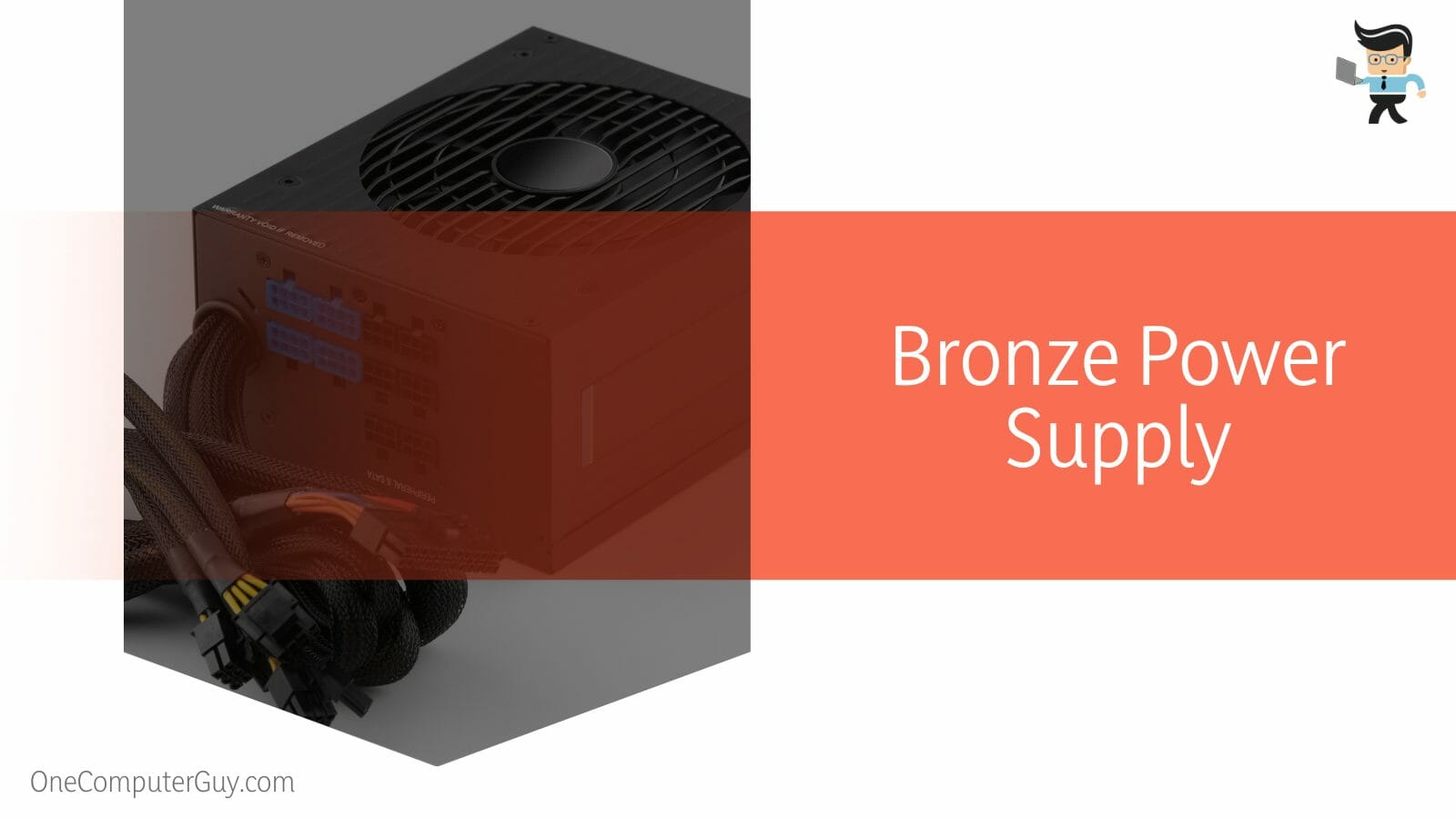
However, if you place too much load on your PSU, it can become overstressed and degrade faster.
– Corsair Power Supply
Corsair PSUs are known to be cheap and ideal for low-end PCs. However, that doesn’t mean that their quality is bad as some users have reported using their Corsair PSUs for up to five years.
– EVGA Power Supply
EVGA PSUs are some top-of-the-line PSUs. The brand is recognized for quality and many of its PSUs are known to exceed seven years.
What Are the Factors That Determine the Lifespan of a PSU?
The factors that determine the lifespan of a PSU include everything from the components used to the overall quality of the PSU itself. Let’s take a closer view at each of these factors and how they affect a power supply’s lifespan.
– Their Continuous vs. Peak Wattage
One important factor that affects your PSU’s lifespan is whether it’s rated for continuous wattage or peak wattage. Peak wattage refers to the maximum amount of power a PSU can provide.
This measurement is often inconsistent so you can get a PSU that’s advertised to have a peak rating of 800 watts but in reality, can only provide about 700 to 750 watts only.
On the other hand, continuous wattage is the amount of power your PSU will maintain under maximum load. This means that a PSU that has a continuous wattage rating of 800 watts will continue to deliver up to 800 watts with no issues.
Besides providing you with steady output, a PSU with continuous wattage will have a better lifespan compared to one with peak wattage. The extension in lifespan also extends to your system as well.
The varying levels of power you’ll get from a peak wattage PSU can lead to the PSU producing more or less power than what’s needed, which can in turn affect its internal components as well as your PC components.
Therefore, make sure you always opt for PSUs with continuous wattage. Brands that produce quality PSUs are known to offer units with continuous wattage.
– Your Power Supply’s Quality
There are different ways to determine the quality of a PSU and one of the most simple and straightforward ways to do so is by looking at its “80” plus certification.
This certification often comes with a precious metal rating, including Bronze, Gold, Silver, and Platinum. With this rating, you’ll be able to determine how efficient your PSU is as well as the amount of power it can convert into heat.
PSUs with at least the 80 Plus Bronze rating will convert 80 percent of the energy they draw into DC power, which is what your computer uses.
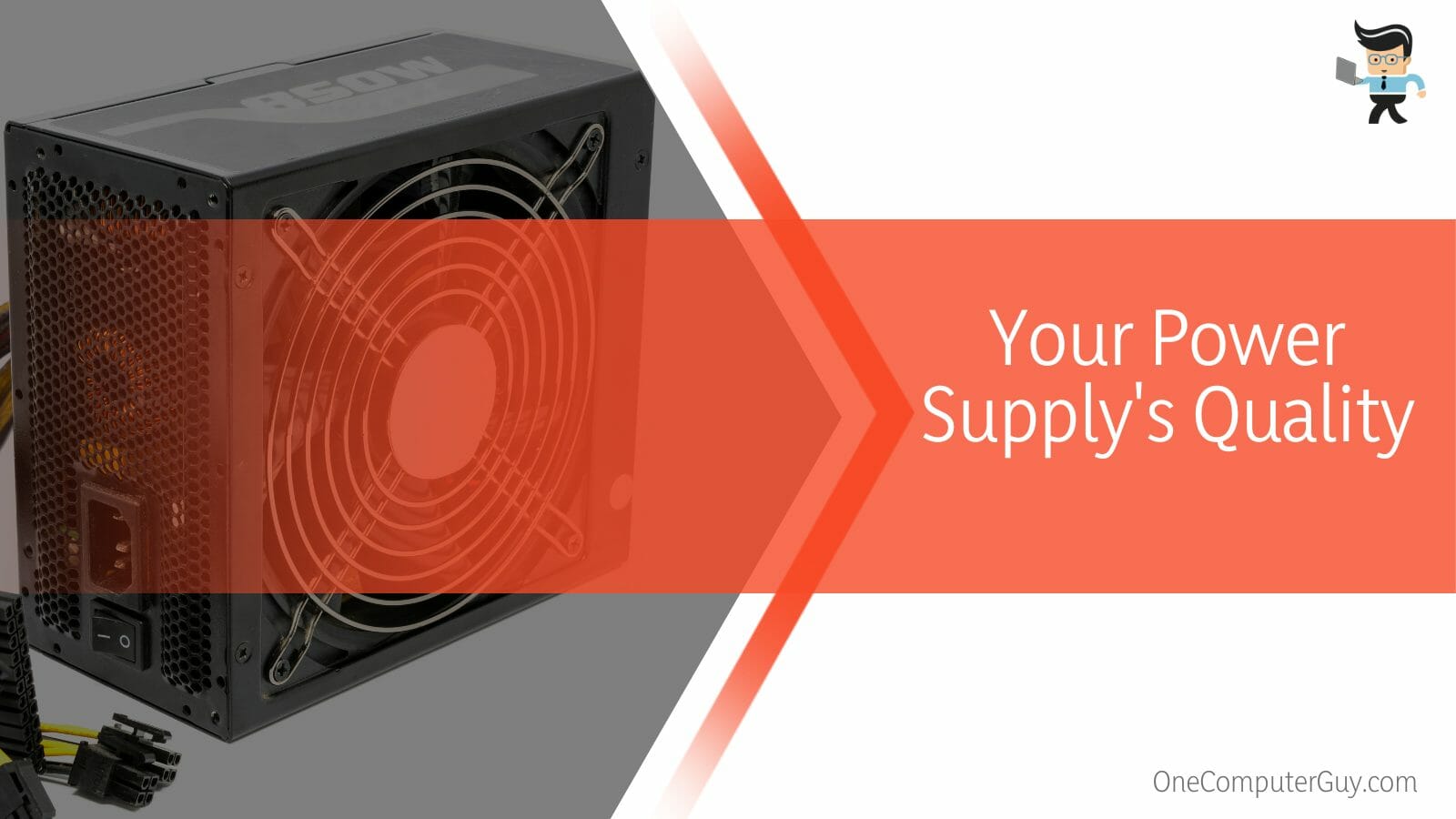
The amount of power converted won’t change no matter the amount of workload your computer is running. In other words, your PSU will be converting 20 percent of the energy it pulls to heat energy, ensuring more efficiency for your PC.
The higher the rating of a PSU, the better its efficiency. For instance, the Seasonic Prime Ultra Titanium, which is one of the best PSUs currently on the market, provides an efficiency of up to 94 percent at half the max load, which means that only six percent of its power is converted into heat.
Less heat translates to a slower degradation process, which is ideal for computers. Since many of your computer’s internal components will be generating heat, you don’t want your PSU to add more heat to the equation.
– The Warranty Offered
In the world of PSUs, many people believe that a higher warranty refers to better quality. After all, the longer the warranty, the higher the lifespan of the PSU should be. However, this is usually not the case as most warranties placed on labels and in product descriptions are more related to advertising and branding than the value of the PSU.
For instance, Corsair’s CS, CV, and CS-M PSUs offer a three-year warranty, their TX series with a Gold rating comes with a seven-year warranty, while their AX1000 series which offers Titanium efficiency offers a whopping ten-year warranty.
As you can see, the higher the price point and efficiency rating, the higher the warranty length you’re likely to get. This doesn’t mean that the costly PSUs are overpriced or that the cheaper ones don’t have excellent quality. However, a typical person will consider the more expensive PSUs to have a better quality due to the amount of warranty it comes with.
Therefore, using a warranty to determine how long your PSU will last isn’t a good idea. You’ll need to carefully research more about the PSU you choose instead of going off of its warranty. To be on the safer side, we recommend that you choose reputable brands instead as many of them are known to provide PSUs that stand the test of time.
Examples of these brands include EVGA, Seasonic, Corsair, Rosewill, Antec, and Cooler Master. While Seasonic and EVGA PSUs are ideal for high-end rigs, the remaining brands work well for medium to low-end builds.
– Power Surges
One of the major factors that can cause your PSU to lose its life prematurely is a power surge. Things like an unstable power grid or inclement weather can cause your electricity to spike or shut off unexpectedly.
The sharp increase or decrease in power can cause the PSU to receive power surges that cause extreme stress as outgoing or incoming current, which can in turn lead to damage.
If you reside in areas where you’re prone to this kind of issue, you want to make sure your PSU is an uninterruptible PSU. These types of PSUs come with small machines that serve as backup generators, ensuring that the PSU has enough time to protect itself and your system whenever there’s a sudden power surge.
If your electricity flashes on instead of being steady, the backup will allow your PSU to handle the stress of the quick and sudden changes. And if there’s a sudden outage, you’ll have enough time to turn off your entire system, including your power supply.
However, keep in mind that uninterruptible PSUs aren’t ideal for long-term use. They are designed to buy you some time so you can keep your system and PSU safe.
What Are the Components That Affect the Lifespan of Your PSU?
The components that affect the lifespan of your power supply unit include the capacitors, resistors, integrated circuits, other semiconductors, voltage regulators, and fans. Below is a better explanation of how each of these components can affect how long your power supply lasts.
– Capacitors
PSUs are made of several components and capacitors are part of this lineup. However, the reason why they are the first on our list is that they are the most common component to get faulty, much like semiconductors.
The older your PSU becomes, the more changes its capacitance value undergoes, thereby changing how efficient your PSU will be when compared to its original design.
Most power supply units use the electrolytic capacitor. This type of capacitor uses pure aluminum foil as its build and aluminum oxide as its dielectric.
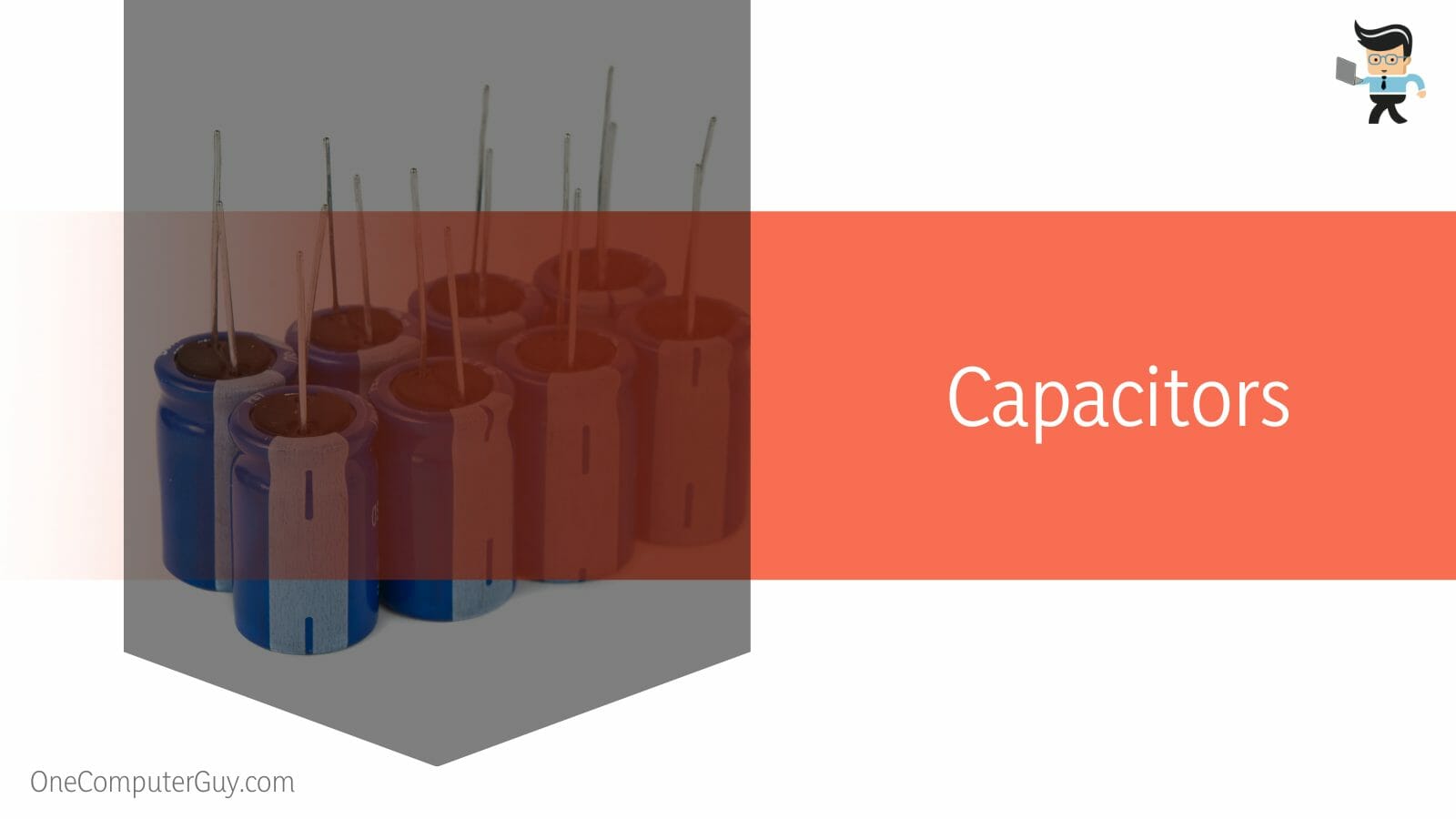
While there’s no specific way to figure out how long an electrolytic capacitor can last, there’s no denying that as the capacitor gets older, it starts losing its electrolytes, which in turn diminishes its capacitance value.
If you’re a gamer or someone who uses their computer for long periods of time, you’ll surely be putting your power supply under a lot of stress. This means that the capacitors embedded in your PSUs are likely to work at higher temperatures when compared to those used for normal applications.
The higher the temperature of your capacitor, the more risk you’ll be bringing to not just your capacitor but other components like resistors and semiconductors, depending on how your unit’s circuit is designed.
This co-dependency will then reflect in the entire system, thereby reducing their lifespan. So, on average, we would like to speculate that a PSU’s capacitor should last between 10 to 20 years, depending on its quality and usage.
– Coils, Inductors, and Transformers
These sets of components are generally more reliable than many of the other components in a power supply unit. However, their reliability also depends on how they are built as cheaply made transformers and poorly designed coils tend to lead to failure.
Unlike capacitors, transformers, coils, and inductors are designed with enamel-coated copper wires that are then wrapped around a magnetic, plastic, or ferrite core.
There are some inductors without cores. These types of inductors feature a thicker gauge wire and they’re often soldered directly into the PCB. Unlike capacitors, coils, transformers, and inductors are less likely to make your components fail unless they go through some sort of physical damage.
– Resistors
Another component that can affect the lifespan of your PSU is the common carbon resistor. The heat exchange that results from converting electrical energy to thermal energy allows resistors to slowly decrease in value.
While this decrease won’t normally provide as much negative impact as a capacitor would, it can still cause your unit to experience irregularities that can put computer components that aren’t getting enough supply at risk.
Once a resistor’s power rating starts getting too low for the task it’s designed for, it can start degrading at a faster pace. This degradation sometimes happens when the circuits are well designed but an ideal value isn’t chosen, thereby causing the component to experience a shorter lifespan.
– Integrated Circuits
Integrated circuits, otherwise known as ICs, have different lifespans. There are many reasons for this variation.
Basically, the lifespan of an integrated circuit depends on how frequently the component it’s stuck in gets hot over time. Sometimes, an IC component can last for a short period due to poor designs and manufacturing standards.
While excellent manufacturing standards do increase the chances of an IC lasting longer, other factors such as the state of the voltage supply line under different conditions, how smooth the supply line is, the amount of load the IC can take, and the design of the IC all contribute to how long it can last, thereby having a direct effect on how long your PSU can last as well.
However, it’s important to note that with the right design and under the right conditions, integrated circuits are likely to last for long periods.
– Cooling Fans
The fans of your PSU are components that can shorten its lifespan once they stop working.
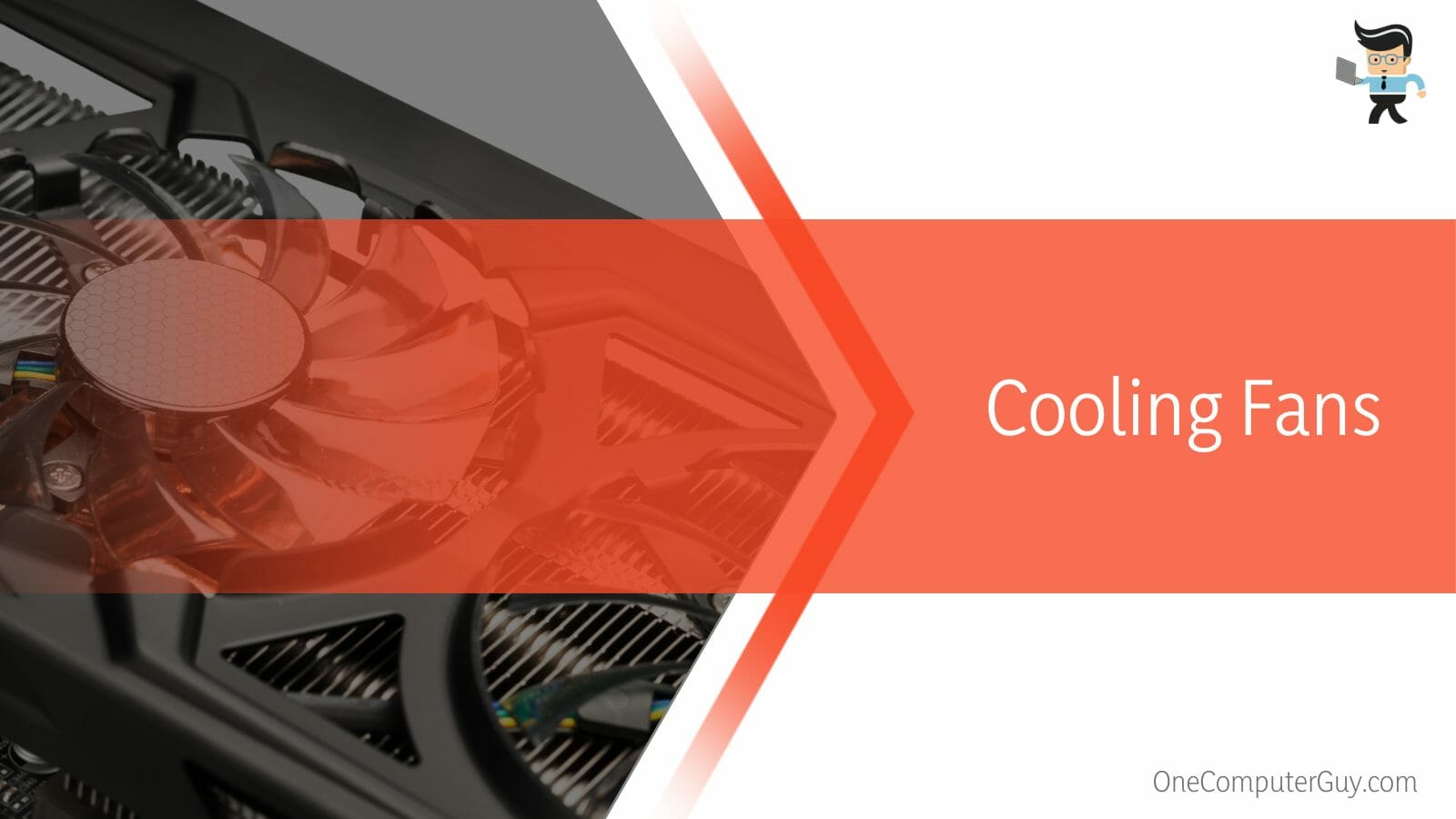
Most fans stop working due to old age as their bearings can cease up due to extended use. Once the bearings go haywire, the fans may start spinning slowly or even refuse to work at all.
Some fans may even become unnecessarily noisy and pull more power before dying out eventually. Most fans have an average lifespan of three and a half years or about 30,000 hours.
– Other Semiconductors
Your power supply’s lifespan also depends on other semiconductors, such as diodes, transistors, MOSFETs, and voltage regulators.
Voltage regulators need to be stable every time so they can properly regulate the amount of power the PSU is drawing and expending. If there’s a problem with the voltage regulator, your unit is sure to experience a shorter lifespan.
Other semiconductors like transistors and MOSFETs deal with power regulation when the unit gets larger currents.
Over time, as the PSU goes through different cooling and heating cycles, many of these components will start losing their efficiency and start producing current leakages, which will in turn shorten your PSU’s lifespan.
How Do You Know If Your PSU Is Giving Out Due to Old Age?
To know if your PSU is giving out due to old age, you can try the paperclip test, where you take a paperclip or other bendable metallic material and plug it into the pins of your PSU to check whether or not it’s still working properly.
– Using the Paperclip Test
If you think that your PSU is beginning to near the end of its lifespan, there are a few methods you can do to ascertain the situation, ensuring that you replace it before it finally goes out.
One of the tests you can do to check if your PSU is dying is the paperclip test and here’s how to go about it:
- Turn off your power supply but leave it plugged into your wall socket.
- Remove every cable attached to the PSU, except the 24-pin connector and the main AC adapter.
- Next, get a paper clip or some sort of bendable metal and bend it into a U-shape so both ends can fit into two pins beside each other.
- Now, while making sure that the paper clip is facing upwards, take the other end of the 24-pin connector that’s not plugged to the PSU and face that towards you.
- Find the fourth pin on the top row; make sure to count from the left.
- Some older PSUs have this fourth pin as a green pin.
- Plug your paper clip into the fourth pin then connect the other end of the clip to the fifth pin from the left.
- Once you’ve securely connected the paper clips, turn on your PSU and check to see if it’s working.
- The power supply’s fan will start spin if it’s working properly.
- In some PSU models, the fans may take some time before spinning; you’ll need to check your manufacturer’s website or PSU manual to see if that’s a sign of normal operation.
- If the fan works or spins momentarily for older PSU models, then your power supply doesn’t have a problem.
– Using a PSU Jumper
Another test you can try is the PSU jumper test. This test involves using a small device that connects to your 24-pin connector and does the same job as the paper clip test described above.

Some of these jumpers even come with their own switches to help you control the testing. Make sure to read the manual of the jumpers properly as there are varying ways to utilize them.
Conclusion
As you can see, there’s no way to pinpoint how long your PSU will last as some PSUs can last a couple of days while others go beyond their warranty years, with some PSUs going up to 12 years.
With that being said, here’s a quick summary to keep in mind when trying to figure out how long your PSU can last:
- Your PSU warranty doesn’t equal the number of years your PSU will last.
- Factors like usage and power surges can kill your PSU faster.
- Always choose a power supply with continuous wattage.
- Quality is more important than warranty when it comes to the lifespan of your PSU.
If you’re keen on trying to figure out how long a PSU lasts, we’ll go ahead and speculate that they have an average lifespan of four to six years.
We recommend that you splurge as much as you can when buying a PSU as the higher the quality and rating of your power supply, the more it’s likely to last.

